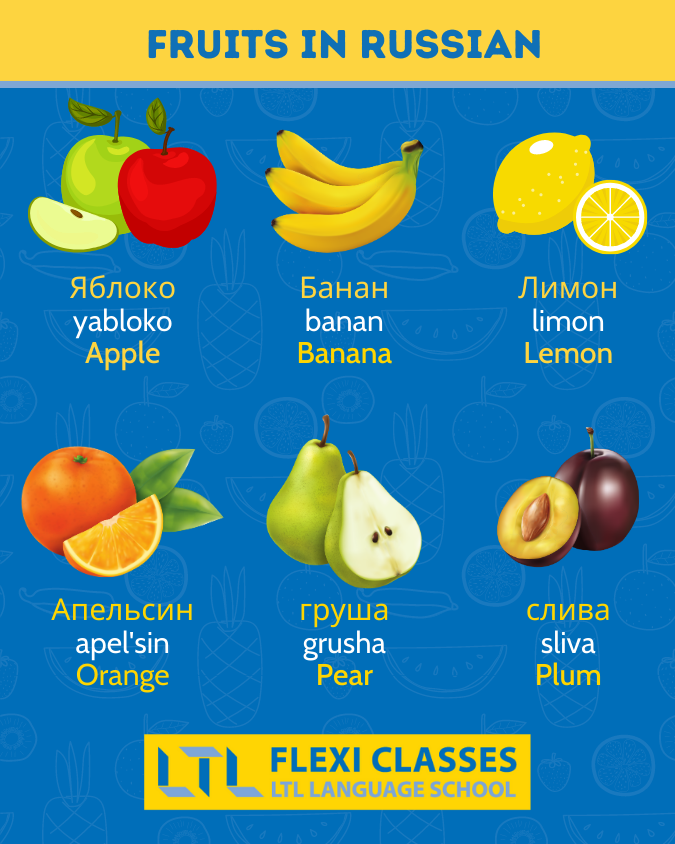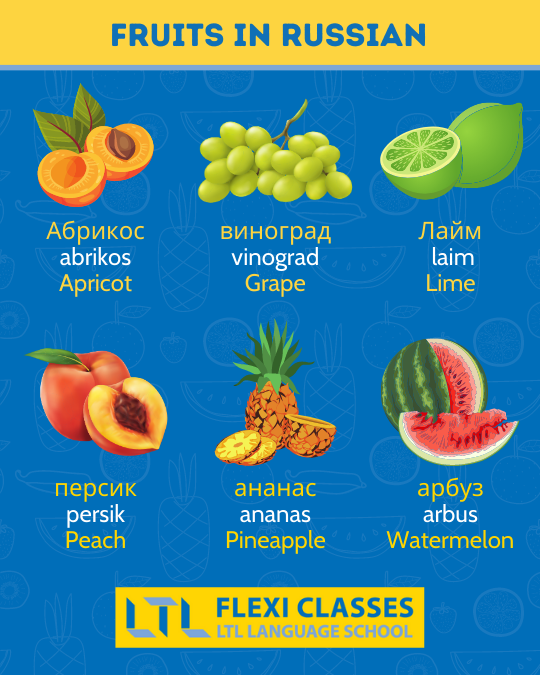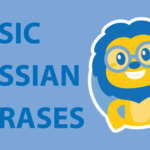Discover 15 Fruits in Russian || Free Flashcards Included
Fruits in Russian || A Guide for Beginners
Welcome Russian language learners!
In this blog post, we will be covering the basics of fruit vocabulary in Russian.
Whether you’re a beginner or looking to expand your vocabulary, this guide will provide you with the essential words and phrases to help you navigate the world of Russian fruit.
From apples to watermelons, you’ll learn how to say it all in no time.
So let’s get started!
Fruits in Russian || Our First Word(s)
Fruits in Russian || Popular Fruits
Fruits in Russian || Other Fruits
Fruits in Russian || Describing Fruit
Fruits in Russian || Russian Fruit Dishes
Fruits in Russian || Examples Sentences
Fruits in Russian || FAQs

Fruits in Russian || Our First Word(s)
Learning basic Russian words can be a fun way to get a feel of the language.
It’s widely regarded that our motivation for learning a new language is at it’s peak in the earlier stages because that is when you learn more.
With that in mind, let’s learn not just one, but two words used for Fruit in Russian.
| English | Russian | Pronunciation |
|---|---|---|
| Fruit | Плод | plod |
| Fruit | Фрукт | frukt |

Фрукт and Плод are both words for fruit in Russian, but they have slightly different meanings.
“Фрукт” (frukt) is a general term for any kind of edible fruit, regardless of its botanical characteristics.
It can refer to fruits that are sweet or sour, juicy or dry, and it can be used to refer to fruits that grow on trees, bushes, or vines.
“Плод” (plod) is a more specific term that refers to the reproductive structures of plants.
It is typically used to refer to fruits that are produced by plants that have flowers and seeds enclosed in a fruit.
This includes fruits such as apples, oranges, and bananas, but does not include fruits like berries, nuts, and seeds, which are not considered true fruits.
In everyday language, “Фрукт” and “Плод” are often used interchangeably, but in botanical or agricultural contexts, “Плод” may be used more specifically to refer to the botanical structure, while “Фрукт” is used more broadly to refer to any edible fruit.
Don’t worry too much about the subtleties like this though – learn both words, and you’re set!
Onwards to the fruits…

A Complete Guide Traditional Russian Food || 14 Must Try Dishes
Discover the best and most traditional Russian food. From hearty stews to rich desserts, Russian food is sure to please your taste buds.
Fruits in Russian || Popular Fruits
Fruits are an amazing gift from nature and there are many types out there that come in different flavours and colours.
One of the most popular groups is the Russian fruits, with their unique names that can sound a bit exotic.
Two of the best Russian fruits you should definitely try are the абрикос, which is basically an apricot, and вишня, which translates to cherry.
Of course, no Russian fruit platter is complete without the beloved яблоко – also known as an apple!
Here is a recap of some of the most popular fruits in Russian culture.
| English | Russian | Pronunciation |
|---|---|---|
| Apricot | Абрикос | abrikos |
| Cherry | Вишня | vishnya |
| Apple | Яблоко | yablako |

Fruits in Russian || Other Fruits
Russian cuisine has been making use of fruit flavouring and ingredients to great effect.
From jams filled with the tart flavours of wild Russian berries to juices made with the incredible variety of fruits available in Russian homes, these drinks and snacks offer a unique experience that can provide a little sweet relief from the Russian winter.
It’s no wonder that Russian culture has developed its own special relationship with fruits as an integral part of its diet and lifestyle.
Let’s discover some more fruits in Russian that are loved across the country.
| English | Russian | Pronunciation |
|---|---|---|
| Pear | Груша | grusha |
| Melon | Дыня | dynya |
| Pineapple | Ананас | ananas |
| Lemon | Лимон | limon |
| Orange | Апельсин | apel’sin |
| Banana | Банан | banan |
| Strawberry | клубника | klubnika |
| Raspberry | малина | malina |
| Mandarin / Tangerine | Мандарин | mandarin |
| Plum | Слива | slyva |
| Mango | Манго | mango |
| Grapefruit | Грейпфрут | greypfrut |

Basic Russian Phrases || A Guide for Beginners
Learn these 45 basic Russian phrases to make your trip to Russia much easier. Understanding the basics of Russian is nowhere near as hard as you may think.
Fruits in Russian || Describing Fruit
Now you know the names of some of your favourite fruits in Russian, perhaps you’ll wnt to add a bit more depth and describe the fruit.
Here are some useful adjectives in Russian to describe you fruit.
| English | Russian | Pronunciation |
|---|---|---|
| Tasty | вкусный | vkusnyy |
| Sour | кислый | kislyy |
| Bitter | горький | gor’kiy |
| Sweet | сладкий | sladkiy |
Fruits in Russian || Russian Fruit Dishes
Russian cuisine has a long history of making use of fruits in traditional dishes.
From the famous vareniki – small pockets of dough filled with fruit and served with sour cream – to sweet compote made from stewed fruit.
Russian cooks have been crafting delicious recipes for centuries.
Blinis, small thin pancakes topped with jam and cream, are also a classic Russian dessert made from fruit.
No matter what type of dish you’re making, don’t forget that adding some fresh or dried Russian fruits can take your recipe to the next level!
| English | Russian | Pronunciation |
|---|---|---|
| Vareniki | вареники | vareniki |
| Kompot | компот | kompot |
| Blini | блины | blini |
| Traditional dish | Традиционное блюдо | tradicionnoe blyudo |
Fruits in Russian || Examples Sentences
We’ve learn XX fruit and 4 adjectives to go along with them – but let’s go one step further.
Here are six sample sentences including some of the fruits in Russian:

- “Я люблю есть яблоки каждый день” (Ya lyublyu yest’ yabloki kazhdyy den’)
- “I love to eat apples every day.”
- “Груши сейчас в сезоне” (Grushi seychas v sezone)
- “Pears are in season now.”
- “Апельсины очень вкусные и полезные для здоровья” (Apel’siny ochen’ vkusnyye i poleznyye dlya zdorov’ya)
- “Oranges are very tasty and healthy.”
- “Бананы отличный вариант для завтрака” (Banany otlichnyy variant dlya zavtraka)
- “Bananas are a great option for breakfast.”
- “Вишня очень красивая и сочная фрукт” (Vishnya ochen’ krasivaya i sochnaya frukt)
- “Cherries are a very beautiful and juicy fruit.”
- “Ананасы растут только в тропических странах” (Ananasy rastut tol’ko v tropicheskikh stranakh)
- “Pineapples grow only in tropical countries.”
So there you have it – Russia has an abundant selection of delicious fruits to try.
From classic favourites like cherries and apples to the more unusual Russian delicacies, there’s something for everyone.
Remember to always look for ripe fruit, shop locally when possible, and enjoy all the amazing flavours that Russia has to offer.
Bon appétit!
Love learning languages? Then why not learn how to say over 50 fruits in Chinese
Fruits in Russian || FAQs
What is fruit in Russian?
Фрукт is the word for fruit in Russian.
Is there a difference between Фрукт and Плод?
Фрукт and Плод are both words for fruit in Russian, but they have slightly different meanings.
“Фрукт” (frukt) is a general term for any kind of edible fruit, regardless of its botanical characteristics.
It can refer to fruits that are sweet or sour, juicy or dry, and it can be used to refer to fruits that grow on trees, bushes, or vines.
“Плод” (plod) is a more specific term that refers to the reproductive structures of plants.
It is typically used to refer to fruits that are produced by plants that have flowers and seeds enclosed in a fruit.
This includes fruits such as apples, oranges, and bananas, but does not include fruits like berries, nuts, and seeds, which are not considered true fruits.
What is pineapple in Russian?
Pienapple in Russian is Ананас which is pronounced ananas.
What is lemon in Russian?
Лимон which is pronounced as limon.
What is Банан?
Банан means banana in Russian.
Want More From LTL?
FANCY LEARNING RUSSIAN? Check out our online Russian courses here.
We offer a 7-day free trial to all online students where you can study Russian 24/7.
Come and be a part of our amazing community.









